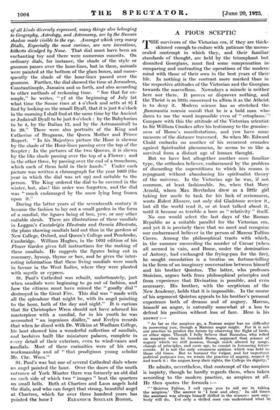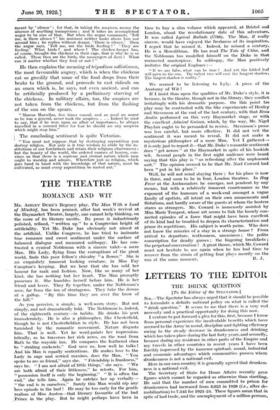A PIOUS SCEPTIC
THE survivors of the Victorian era, if they are thick skinned enough to endure with patience the uncon, cealed contempt in which they, and their familiar; standards of thought, are held by the triumphant but disunited Georgians, must find some compensation ini comparing and contrasting the operations of the modern mind with those of their own in the best years of their; life. In nothing is the contrast more marked than in. the respective attitudes of the Victorian and the Georgian, towards the marvellous. Nowadays a miracle is neither' here nor there. It proves or disproves nothing, and the Theist is as little concerned to affirm it as the Atheist is to deny it. Modern science has so stretched the' flammantia moenia mundi that he is a bold man who dares to use the word impossible even of " ectoplasm.") Compare with this the attitude of the Victorian scientist, to Sir William Crookes after his testimony to the genuine-. ness of Home's manifestations, and you have some measure of the distance traversed. So when Mr. Edward Clodd embarks on another of his recurrent crusades against Spiritualist phenomena, he seems to us like a: survival from a distant age of human thought.
But we have lost altogether another once familiar, type, the orthodox believer, embarrassed by the problem of discarding the superstitions to which his reason is repugnant without abandoning his spiritualist theory' of the universe. In the Victorian age he was, if not common, at least fashionable. So, when that Mary Arnold, whom Max Beerbohm drew as a little girl taking her uncle to task for his lack of seriousness,. wrote Robert Elsmere, not only did Gladstone review it,; but all the world read it, or at least talked about it,, until it became as terrible a bore as " relativity " itself., No one would select the last days of the Roman Republic as a suitable parallel for the Victorian era, and yet it is precisely there that we meet and recognize our embarrassed believer in the person of Marcus Tullius; Cicero. Among the philosophical tracts with which,, in the summer succeeding the murder of Caesar (whew all seemed in vain, and Rome, under the domination. of Antony, had exchanged the frying-pan for the fire),, he sought consolation is a treatise on fortune-telling in the form of an imaginary conversation between himself and his brother Quintus. The latter, who professes Stoicism, argues both from philosophical principles and from experience that Divination is possible, and even necessary. His brother, with the scepticism of the New Academy, holds that it is impossible. In the course of his argument Quintus appeals to his brother's personal experience both of dreams and of augury. Marcus, himself an augur, is naturally somewhat at a loss to defend his position without loss of face. Here is his answer :- " As far as the auspices go, a Roman augur has no difficulty in answering you, though a Miamian augur might. For it is not our practice to predict the future by observing the flight of birds, or other signs. Though I fully believe that Romulus, who relied on auspices when he founded Rome, supposed that science of augury which we still possess, though much altered by usage,, change of principles, and mere age, to consist in foreseeing future events. It is not the only erroneous opinion which was held in those old times. But to humour the vulgar, and for important political purposes too, we retain the practice of augury, respect it and teach it : the augurs keep their rights, the College its dignity."
He admits, nevertheless, that contempt of the auspices is impiety, though he hardly regards them, when taken according to the modern practice, as auspices at all.. He then quotes the formula :- " Quintus Fabius, I call upon you to aid me in taking the auspices.' The answer is I hear and obey.' In old times the assistant was always himself skilled in the science : now any- body will do. Yet only a skilled man can understand what isl
meant by ' silence ' : for that, in taking the auspices, means the absence of anything inauspicious ; and it takes an accomplished augur to be sure of that. But when the augur commands, Tell me, is there silence ? ' his assistant neither looks above him nor around him ; he replies without demur, There is silence.' Then the augur says, Tell me, are the birds feeding ? " They are feeding.' What birds ? and where ? The chicken-keeper has, 'of course, brought the chickens in their cage, that is why he is so called. These then are the birds, the messengers of Jove ! What can it matter whether they feed or not ? "
He then explains the meaning of tripudium sollistimunt, the most favourable augury, which is when the chickens .eat so greedily that some of the food drops from their 'beaks to the ground, and proceeds to cast ridicule on an omen which is, he says, not even ancient, and can be artificially produced by a preliminary starving of the chickens. In military affairs, too, the auspices are not taken from the chickens, but from the flashing of the sun on the spears.
" Marcus Marcellus, five times consul, and as good an augur as ho was a general, never took the auspices. . . . Indeed he used to say, that if he were upon an affair of importance, he always travelled in a covered litter for fear ho should see any auspices which might stop him."
The concluding sentiment is quite Victorian.
" You must not suppose that by destroying superstition you destroy religion. Not only is it true wisdom to abide by the in- stitutions of our forefathers and retain their religious observances : but the beauty of the world, the ordered courses of heaven, con- vince us that there is a supreme and eternal nature which men ought to worship and admire. Wherefore just as religion, which goes hand in hand with the knowledge of that nature, must be cultivated, so must every superstition be rooted out."











































 Previous page
Previous page